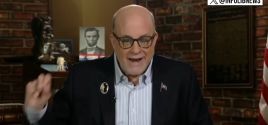ACTA -- A Patriot Act For the InternetJames LoveHuffington Post Nov. 04, 2009 |
Popular 
Trump Expected to Pick Kevin Warsh, Son-in-Law of Zionist Billionaire Ron Lauder, as Fed Chair

Video Appears to Show Alex Pretti Spit at ICE, Kick Taillight Out of ICE Vehicle in Prior Confrontation

New TikTok CEO Told World Jewish Congress How They Censored Criticism of 'Zionists'

Israeli-American Council Asks Miriam Adelson and Haim Saban How They Control U.S. Politicians

Mark Levin Urges Trump to Strike Iran and Kill the Ayatollah and His Family
 This week 40 or so countries are meeting in South Korea to consider text for a new international agreement on the enforcement of intellectual property rights. It is called the Anti-Counterfeiting Trade Agreement (ACTA). The term "counterfeiting" is designed to demonize the agreement critics as friends of organized crime, much like the name of the Patriot Act seemed better than the "Elimination of Civil Liberties Act." It is really an agreement that addresses a wide range of intellectual property enforcement issues -- involving patents, copyrights, trademarks and other IPR. (Details here) If you are a lowly member of the public, the text is secret. The names of persons who attend the meetings are secret. The titles of the documents are secret. If you represent a big firm or law firm -- pretty much any big firm it seems, the U.S. government will show you documents after you sign a non-disclosure agreement - curbing your right to speak out on the contents of the documents you see. Some details of the negotiation have leaked out, most recently from a memo by Euopean Union describing the Obama Administration proposal for a new global system of Internet controls and liabilities. Michael Geist, Gwen Hienz of EFF, and a few journalists -- most living outside of the U.S., have written about ACTA. The entire U.S. tech sector has been publicly silent, as the Obama administration has co-oped them into trading silence for access to the secret documents. At this point, Congress needs to stand up and put an end to this appalling spectacle of secret legislation on a global scale. How can politicians claim to be all for transparency, and allow this indefensible violation of the public right to know proceed? A large number of organizations and people have written President Obama asking that he end the secrecy of the negotiation. It is doubtful this will happen unless newspapers write about the issue (aren't they big advocates of the right to know?), members of Congress weigh in, or if the critics of the secret negotiation can mobilize public opinion. There is a lot at stake. Civil rights, privacy, rules for injunctions and damages against businesses and individuals, chilling of speech, the first sale doctrine, the global movement of medicines and other commodities, etc, will all be impacted by this ridiculously secret negotiation. Earth to politicians -- you work for us, not the International Chamber of Commerce. Make this negotiation public! |



